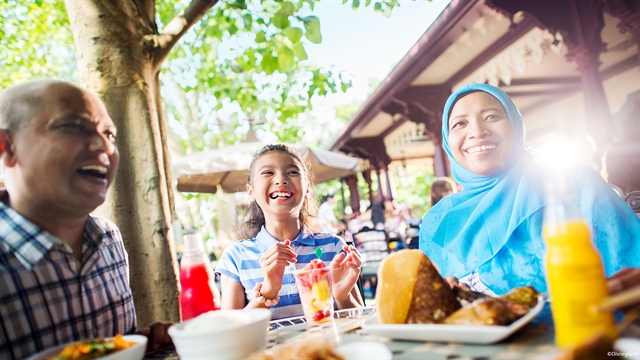Weather:
- Ha Noi 26oC
- Da Nang 26oC
- Ho Chi Minh 25oC

HCM CITY — To develop tourism into a key economic sector with an increasing contribution to the country’s GDP and as a driving force for other industries, diversifying tourism markets, especially tapping into potential markets, is a crucial issue for Việt Nam’s tourism sector.
Potential of the Halal tourism market
Muslim tourists, often referred to as part of the Halal tourism sector (from the Arabic word “Halal,” meaning permissible under Islamic law), represent a market with significant development potential, especially in major tourism destinations.
Some analysts suggest the Halal industry, encompassing food, fashion, tourism, and other consumer services for Muslims, holds great promise.
Halal tourism alone is projected to contribute nearly US$350 billion to the global tourism economy by 2030.
With over 1.9 billion Muslims worldwide, this is a niche market with major growth potential that Việt Nam’s tourism sector should target with a clear attraction strategy.
According to Hà Văn Siêu, deputy director general of the Việt Nam National Authority of Tourism, the number of tourists from Muslim countries visiting Việt Nam has grown considerably in recent years.
The Halal tourism market presents promising opportunities for Việt Nam and is considered a "gold mine" that can boost the tourism industry.
Nguyễn Thị Ngọc Hằng, representative of the Halal Certification Office - HCA Việt Nam, stated that Muslims make up one-fourth of the world's population, with over 40 per cent in Southeast Asia alone.
With many religious holidays throughout the year, Muslim demand for travel spikes during these periods.
Moreover, Muslim tourists are known for high spending and long stays, provided that Halal-compliant services and products are available.
Expert Huỳnh Thanh Tâm from the HCM City Trade and Investment Promotion Centre noted that Muslim tourists are very interested in exploring local cultures.
While Việt Nam, particularly the southern region, holds great cultural tourism potential, this has not yet been fully leveraged.
For instance, in addition to Kinh, Khmer, and Hoa ethnic groups, the Chăm Muslim community has long been present in southern provinces.
An Giang Province has the largest Chăm population in southern Việt Nam, with over 15,300 people.
Promoting and showcasing Chăm Islamic culture could significantly contribute to local tourism development and attract more Muslim visitors from other countries and territories.

Tailored solutions
Muslim tourists often travel in groups, stay longer, spend more, and prefer destinations with natural beauty and rich cultural heritage.
However, to properly welcome and serve this segment, experts argue that targeted solutions are needed.
Trần Văn Tân Cương, director of the National Halal Company of Việt Nam, emphasised that Muslim tourists have very specific requirements.
All services, from accommodation and dining to leisure, must meet Halal certification standards based on Islamic law.
A seamless supply chain is necessary, covering attractions, accommodations, food services, and religious facilities.
Đoàn Đức Minh from the University of Economics in HCM City added that many places across Việt Nam possess the natural and cultural features that appeal to Muslim travelers.
Yet, a key obstacle remains: the lack of certified Halal accommodations, restaurants, and prayer facilities.
Addressing these gaps could help attract more Muslim tourists and bring significant tourism revenue to localities.
From a business perspective, a representative from Vietravel, a leading travel and service company, highlighted their appreciation for the Halal tourism market.
The company has created specific tour packages tailored to the psychological, religious, and dietary needs of Muslim travelers.
These include Halal-certified hotels and restaurants, visits to mosques and Muslim communities, and Muslim-friendly tour guides.
From Tiền Giang Province, Dr. Nguyễn Phùng Thu Trinh from Văn Hiến University observed a growing number of Muslim tour groups from Malaysia, Indonesia, Singapore, and India visiting the area.
Most of them enjoy eco-tours, garden-style tourism, and culturally appropriate cuisine. Locals also offer warm hospitality.
However, the level of service usage and spending by these tourists remains low due to a lack of Halal-compliant destinations and shopping options.
In Tiền Giang, Muslim groups often dine at places like Bách Tùng Viên, Halal Mekong, or use catering services at the Indian Mosque in Mỹ Tho City.
However, in general, Muslim tourists have few opportunities to “spend” as there are limited specialty shopping venues catering to their specific needs.
The Prime Minister has approved a project titled “Strengthening International Cooperation to Build and Develop Việt Nam’s Halal Industry by 2030.”
This sets out major orientations to develop a systematic, professional Halal sector in Việt Nam, helping businesses effectively participate in global Halal production and supply chains.
Dr. Nguyễn Phùng Thu Trinh proposed that in the tourism and service sectors, to attract more Muslim travelers and diversify tourist demographics, localities should actively develop and promote Halal-certified culinary products, specialties, and souvenirs.
These would not only serve Muslim visitors effectively but also increase tourism and service revenue for local economies. — VNS


